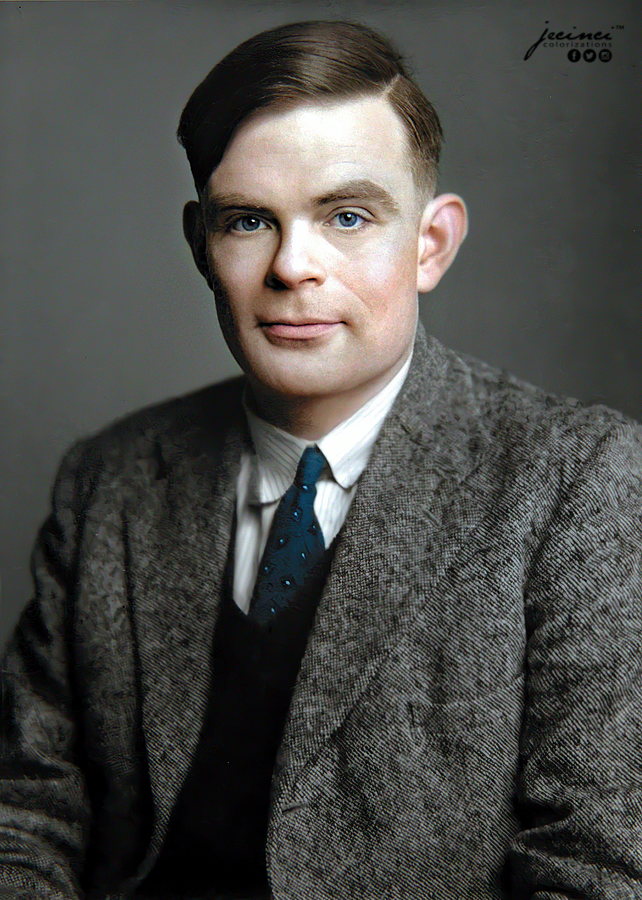Alan Turing, the brilliant mathematician, logician, and cryptanalyst, is celebrated as one of the greatest minds of the 20th century. Born on June 23, 1912, in Maida Vale, London, his contributions to mathematics, computer science, and the Allied victory in World War II are unparalleled. However, his life was marked by both intellectual triumphs and personal tragedies, culminating in his untimely death and leaving behind a legacy that continues to inspire and provoke.
Turing’s early years displayed signs of his exceptional intellect. He attended Sherborne School, where his talent for mathematics became evident. He later studied mathematics at King’s College, Cambridge, graduating with first-class honors in 1934. Turing’s academic journey was punctuated by groundbreaking discoveries, including his work on computable numbers and the Turing machine, which laid the theoretical groundwork for modern computing.
During World War II, Turing’s expertise in cryptography proved invaluable. He played a pivotal role in deciphering the German Enigma machine, a feat that significantly contributed to the Allies’ victory. Turing’s efforts at Bletchley Park, where he worked alongside other codebreakers, including Joan Clarke, showcased his formidable intellect and problem-solving skills. His work on the bombe machine, designed to crack Enigma-encoded messages, exemplified his innovative approach to complex challenges.
Despite his wartime contributions, Turing’s achievements remained largely unrecognized during his lifetime due to the secrecy surrounding his work. However, his impact on cryptography and computing would become increasingly apparent in the post-war era.
Following the war, Turing shifted his focus to the emerging field of artificial intelligence (AI). In his seminal paper “Computing Machinery and Intelligence” published in 1950, Turing proposed the eponymous Turing Test as a measure of a machine’s intelligence. His visionary ideas laid the foundation for AI research and sparked debates about the nature of consciousness and the potential of machines to think.
Turing’s pioneering work in AI was paralleled by his contributions to the development of early computers. He joined the National Physical Laboratory (NPL) in 1945, where he worked on the design of the Automatic Computing Engine (ACE), one of the first stored-program computers. Turing’s insights into algorithms and programming languages were instrumental in shaping the nascent field of computer science.
However, Turing’s personal life was fraught with challenges, exacerbated by the social norms and prejudices of his time. His homosexuality, then considered a criminal offense in the United Kingdom, subjected him to persecution and discrimination. In 1952, Turing’s relationship with another man led to his arrest and prosecution under anti-homosexuality laws. He was convicted of “gross indecency” and subjected to chemical castration, a barbaric practice intended to suppress his sexual orientation.
The persecution and humiliation inflicted upon Turing took a severe toll on his mental and physical well-being. Despite his resilience and continued contributions to academia, he grappled with depression and isolation. In 1954, at the age of 41, Turing tragically died from cyanide poisoning, in what was officially ruled a suicide.
The circumstances surrounding Turing’s death cast a shadow over his legacy, highlighting the injustice and cruelty he endured. It wasn’t until decades later that his contributions to cryptography, computing, and AI were fully recognized and celebrated. In 2009, the British government issued a formal apology for Turing’s treatment, acknowledging the profound injustice he suffered.
Since then, efforts to honor Turing’s memory and contributions have proliferated. In 2013, Queen Elizabeth II granted him a posthumous royal pardon, acknowledging the unjust nature of his conviction. The Alan Turing Institute, established in 2015, serves as a testament to his enduring influence on science and technology. Dedicated to advancing data science and AI research, the institute embodies Turing’s spirit of innovation and inquiry.
Turing’s impact extends far beyond the realms of academia and technology. His legacy serves as a poignant reminder of the consequences of prejudice and discrimination, and the importance of upholding human dignity and equality. The Alan Turing Law, passed in 2017, posthumously pardoned thousands of men who, like Turing, were convicted of historical homosexual offenses, symbolizing a belated recognition of their unjust treatment.
Moreover, Turing’s work continues to inspire new generations of scientists, mathematicians, and innovators. His insights into computation and artificial intelligence laid the groundwork for the digital age, shaping the world we inhabit today. From the algorithms that power our smartphones to the AI systems that drive scientific discovery, Turing’s legacy reverberates through every facet of modern life.
In commemorating Turing’s legacy, it is essential to reflect not only on his extraordinary intellect and achievements but also on the injustices he endured and the societal prejudices that marred his life. By honoring Turing’s memory and recognizing his contributions, we reaffirm our commitment to fostering a more inclusive and equitable world, where all individuals are valued and respected for their talents and humanity.
In conclusion, Alan Turing’s life encapsulates the complexities of genius and tragedy, perseverance and persecution. His intellect reshaped the course of history, while his personal struggles exposed the dark undercurrents of discrimination and intolerance. As we celebrate Turing’s remarkable legacy, let us strive to honor his memory by championing the values of justice, compassion, and intellectual freedom for which he so fiercely advocated.





